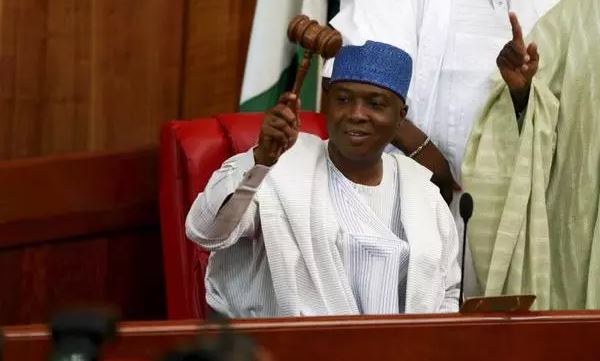Again, NASS salivates for immunity

The lingering controversy on the need or otherwise for the Senate President and his deputy; Speaker of the House of Representatives and his deputy; and, perhaps, the Chief Justice of Nigeria (CJN) to be shielded with the nature of immunity being enjoyed by the President, Vice President, Governors and Deputy Governors, is a crisp reminder of the low moments of the House of Representatives about three years ago, when it first toyed with the idea. The only difference then was that the CJN was not in the picture. Executive repression, harassment and blackmail are often cited as basis for the desperation.
Section 308 of the 1999 Constitution (as amended) says in respect of occupants of the offices of President, Vice President, Governor and the Deputy Governor: "Notwithstanding anything to the contrary in this Constitution, but sub¬ject to Sub-section (2) of this Section – no civil or criminal proceedings shall be instituted or continued against a person to whom this section applies during his period of office. A person to whom this section applies shall not be arrested or imprisoned during that period, either in pursuance of the process of any court or otherwise. No process of any court requiring or compelling the appearance of a person to whom this section applies shall be applied for or issued".Section 3 of the Legislative Houses (Powers and Privileges) Act also provides parliamentary immunity from proceed¬ings for the legislature. It says: "No civil or criminal proceedings may be instituted against any member of a Legislative House in respect of words spoken before that House or a Committee thereof; or in respect of words written in a report to that House or to any Committee thereof, or in any petition, bill, resolution, motion or question brought or introduced by him therein". The judiciary enjoys institutional independence, too. In their capacities as law officers, judges, for instance, enjoy legal protection and personal independence in their utterances and actions in the course of discharging their official duties. It is also most improbable that members of the National Assembly do not understand the nature of immunity the Constitution confers on each arm of government before choosing to join the legislature. But in 2003, the House of Representatives flew a kite widely believed to be a ploy by the legislature to grant itself the kind of immunity reserved for the aforementioned leaders in the executive arm of government.
Rep Ali Ahmed ( Peoples Democratic Party, PDP, Kwara State), early that year, we recall, sponsored "A Bill for an Act to Alter the Constitution of the Federal Republic of Nigeria, 1999 (as amended) by providing immunity for members of the legislature in respect of the words spoken or written at the plenary session or at committee proceedings, to guarantee that freedom of speech, debates and proceedings in Legislative Houses are not impeached or questioned in any court or place out of parliament and for related matters". The bill was consolidated with another similar one sponsored by Rep Raphael Igbokwe (PDP, Imo). In his lead debate on the consolidated bill, Ahmed said the objective of the proposed amendment was to alter the provisions of Section 4 (8) of the 1999 Constitution which says the jurisdiction of the courts cannot be ousted by the actions or proceedings of the parliament.Remember that the initiative did not enjoy the support of the Red Chamber (Senate), which said through its Committee on Information, Media and Public Affairs Chairman then, Enyinnaya Abaribe, that the Legislative Powers and Privileges Act made sufficient provisions for the immunity of every lawmaker within the precincts of the National Assembly; and that there was no need for additional legal provisions for such privilege.
<In addition to the caustic public criticisms that assailed the plot, some senior members of the Bar that viewed it as unconstitutional, unethical and more of an ego trip than a piece of legislation meant to benefit the country and its citizens, threatened to challenge in court the bill which had passed through the second reading in the House. Eventually, the Reps tactically retreated. It is unfortunate that the matter was again resurrected lately by Rep Leo Ogor, possibly because of the ongoing travails of the Senate President, Dr. Bukola Saraki, at the Code of Conduct Tribunal (CCT). However, the NASS should be circumspect about resort to self-help. The nation is presently perching on the edge of the precipice because of widespread impunity in the political space in recent years. As a separate arm of government, the NASS should seek alternative ways of fencing off executive high-handedness without infracting the provisions of the Constitution.
Cloud Tag: What's trending
Click on a word/phrase to read more about it.
Standard Organization Of Nigeria Funmilayo Mohammed IDPU Wahab Agbaje Isau Baba Adini Of Kwara State Tayo Awodiji Oni Adebayo Nupe Afusat Nike Ibrahim Babatunde Ishola Babaita Saliu Mustapha Alikinla Senate Presidency Code Of Conduct Tribunal Joshua Adeyemi Adimula Ganmo Electricity Sub-Station Kwara State Government Split Diamond Interchange Isiaka Abdulrazak Ojuekun Sarumi Memunat Monsuma Gbugbu Muftau Akanbi Oke Tunji Folami Olatunde Jare Saka Adeyemo Oniwasi Agbaye Rafiu Ibrahim Ayobami Akanbi Alfa Belgore Olabanji Orilonishe Sabo-Oke NITDA Ibrahim Akaje Abubakar Kawu Baraje Aliyu Adebayo Muhammadu Gobir Nagode Bayer AG Olubukola Kifayat Adedeji Muhammed Mahe Abdulkadir Centre For Community Empowerment And Poverty Eradication Asa Chartered Institute Of Personnel Management Of Nigeria Okanlawon Taiwo Afolasade Opeyemi Kemi Abdulganiyu Oladosu Eruku Tafidan Kaiama UTME Overland Titus Ashaolu Umaru Saro Oyawoye Isiaka Rafiu Mope Assayomo Bluenile Associates Muslimah Entrepreneurship Forum New Nigeria People’s Party Olatinwo Yomi Ogunsola Olayinka Jelili Yusuf Neuropsychiatric Hospital Saba Mamman Daniel AbdulHamid Adi Sambo Murtala Shola Odetundun Third Estate Olatunde Oyeyiola Rasaq Jimoh Oloruntoyosi Thomas Kola Ologbondiyan Kamoru Kadiri Olam Food Ingredients Oba Mogaji Abdulkadir Umar Saro


